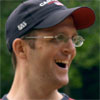 Been reading Walter Isaacson’s Einstein bio. It’s awesome. This morning read this thought-provoking quote from Einstein and couldn’t help but think that this idea holds the key to solve the disconnect between science and religion in popular thought.
Been reading Walter Isaacson’s Einstein bio. It’s awesome. This morning read this thought-provoking quote from Einstein and couldn’t help but think that this idea holds the key to solve the disconnect between science and religion in popular thought. "Some scientific theories depend primarily on induction: analyzing a lot of experimental findings and then finding theories that explain the empirical patterns. Others depend more on deduction: starting with elegant principles and postulates that are embraced as holy and then deducting the consequences from them. All scientists blend both approaches to differing degrees. Einstein had a good feel for experimental findings, and he used this knowledge to find certain fixed points with which he could construct a theory. But his emphasis was primarily on the deductive approach... ‘The simplest picture one can form about the creation of an empirical science is along the lines of an inductive method. Individual facts are selected and grouped together so that the laws that connect them become apparent. However, the big advances in scientific knowledge originated in this way only to a small degree. The truly great advances in our understanding of nature originated in a way almost diametrically opposed to induction. The intuitive grasp of the essentials of a large complex of facts leads the scientist to the postulation of hypothetical basic laws. From these laws, he derives his conclusions.’” (Isaacson, Einstein, p.117/118)
"’The deeper we penetrate and the more extensive our theories become,’ [Einstein] would declare toward the end of his life, ‘the less empirical knowledge is needed to determine these theories.’" (p. 118)
Most often people dismiss religion as being relative and therefore not authoritative because it is unverifiable, not testable. But theologians are attempting to do the same thing Einstein sought with his deductive thought experiments: move humanity great leaps forward in their understanding of creation. Theologians shouldn't ignore the evidence of life any more than Einstein was ignoring the experiments of scientists of his day (he wasn't). But experimentation is not the key to getting human beings to understand the universe, as Einstein said, deductive reasoning is. Einstein seems to stand as the preeminent example of a critical thinker who models how rational deductive reasoning should proceed.
C.S. Lewis used thought experiments too. The difference between someone like Lewis and someone like Einstein is not really in terms of process, but rather in terms of semantics. Theologians don't say they discover things about God's way, and the scientist doesn't say that they discover things about God's way. But in reality, they're both describing the exact same things. Both theologians and scientists who rely on Einstein's model are both using deductive reasoning to determine the reality of creation. If they're good at their job, neither is doing so to with disregard to the facts of the universe, but they are attempting to move human understanding ahead of where inductive science and everyday experience currently take us.
